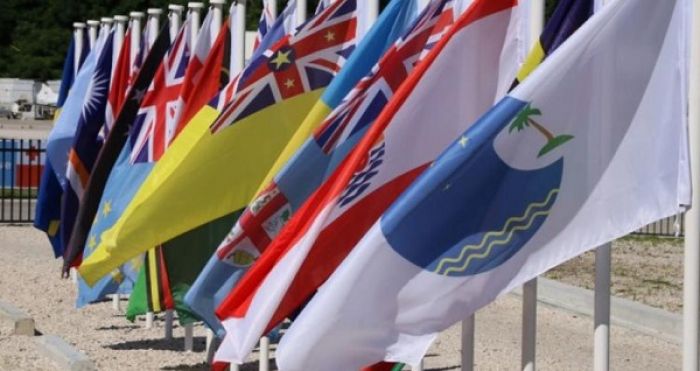Australia and New Zealand Must Rethink Their Approach to Pacific Trade Featured

By Cleo Paskal
29 November, 2018. Canberra and Wellington’s misguided policies towards Pacific island economies will undermine their relationships and open the region to further influence from China.
The countries of Oceania have wildly different economies – Papua New Guinea (PNG) exported close to $4 billion in oil and gas in 2016, while in Tonga, the biggest commodity export was $11.6 million worth of agricultural products. But what they have in common is a history of communal landownership, an emphasis on social capital (as opposed to financial capital), and cash-strapped governments.
In many cases, the first two combine to supplement the shortfalls of the last. There may not be government-funded welfare, but someone in the extended family likely has access to land where they can grow food, or will share their fish catch, or will do a church fundraiser to help with school fees. It’s not ideal, but it often works.
The problem is that this sort of economy is deemed ‘unproductive’ by neighbours Australia and New Zealand, as well as by regionally influential international organizations such as the Asian Development Bank. Communally held land is considered an impediment to conventional economic concepts of development because it means foreign investors cannot buy land (though usually they can lease). This has led to unrelenting pressure by Canberra and Wellington on Pacific island countries to ‘open up’ their economies.
The most recent effort is the PACER (Pacific Agreement on Closer Economic Relations) Plus free trade deal. It is designed to make Pacific island countries drop tariffs for Australian and New Zealand goods and guarantee that Australia and New Zealand will always have preferential access to their markets through a most favoured nation clause.
But these countries already have tariff free access to Australia and New Zealand, so there is little reason for them to join PACER Plus. The larger ones haven’t. PNG and Fiji refused to join over concerns over what it would do to their nascent industries. The states in free association with the US (Palau, the Marshall Islands and the Federated States of Micronesia) have also not yet signed.
It is only the smaller, more economically vulnerable Pacific island countries that have signed so far. A key reason is that Canberra and Wellington have tied participation in PACER Plus to an unrelated scheme allowing participation in seasonal worker programmes, in which Pacific islanders work mostly as low-skilled agricultural labour in Australia and New Zealand. Those states that don’t sign might not get to send workers.
Canberra and Wellington have also continued pressure to privatize land. In Samoa, where land ownership was switched to a system friendlier to foreign investors, there are already regular public demonstrations against the change.
Which starts to give an indication of the problems of PACER Plus, and of how tightly linked economics and security are in Oceania. The systematic efforts to undermine communal land ownership and replace social capital with financial capital while depleting already thin government coffers through reductions in tariffs creates a mass of vulnerabilities, including food insecurity, unrest and dislocation, in an area already suffering increasing environmental crises.
PACER Plus will also fragment the region economically into signatories and non-signatories. Currently Tonga imports most of its commodities from neighbouring Fiji. Under PACER Plus, New Zealand will have to get better trade terms from Tonga than non-signatory Fiji, driving an economic wedge between the much more compatible, and mutually supporting, economies.
An expert panel considers how new regional dynamics, economic competition and security challenges are impacting the Pacific.
It might seem like this would increase the dominance of Australia and New Zealand in the region. But as Pacific economies are being forced to open, it is China, with its extensive government backing of business, which is the main winner.
Currently over 80 per cent of the retail sector in Tonga is run by recently arrived Chinese traders, and much of the newly available land in some countries has Chinese owners. It will also very likely be Chinese-backed businesses, perhaps registered in Australia or New Zealand, that will be the biggest beneficiaries of PACER Plus.
China can use such levers to gain economic influence and possibly even access to critical infrastructure like ports and telecoms. China has done this before, including in Australia, where a Chinese government-linked company bought the lease to the strategic port of Darwin. Advances in Chinese influence in the region are even more likely as the lowered tariff revenue in vulnerable island economies will make them more open to Chinese loans.
It is unlikely Australian or New Zealand development aid will fill the gaps either. In both countries, government aid is now run out their foreign affairs and trade ministries, and so reflects those priorities.
They are setting worrying precedents. For example, Canberra and Wellington tied aid dispersal for the police in Tonga to a deal for the country to accept a New Zealander as police commissioner. This cut down on community trust in the police and thus information flows, including on crime in the Chinese community. One commissioner used his position to get a warrant to seize the Tongan immigration database and send it out of the country.
Were China to offer a bigger aid package to Tonga, it might then use some of the same pressure to extend Chinese influence in the country – and given the track record, it would be difficult for Australia and New Zealand to protest.
New Zealand’s new government has promised a ‘Pacific reset’. It is urgently needed.
The neo-colonial model should be abandoned and another model, closer to the US–India relationship, should be adopted – one in which the overall importance of the strategic partnership to regional security outweighs the need to control every aspect of domestic markets.
Short-term economic policies should be re-examined and, ideally, New Zealand’s international aid department would be given autonomy from foreign affairs and trade priorities. Australia should rethink its approach along these lines as well.
Pacific island economies need to be allowed to protect themselves and grow on their own terms. Such natural growth would benefit Australia and New Zealand anyway, as important regional markets, without undermining the stability or resiliency of the region.
If instead states continue to be pushed into these unworkable trade structures, not only will the people of the region be worse off, Australia and New Zealand will ultimately bring about the loss of influence that they seek to avoid.
Cleo Paskal is an Associate Fellow in the Energy, Environment and Resources Department and Asia-Pacific Programme, Chattam House, Royal Institute of International Affairs.
- Chattam House
2 comments
-

This is a clear dissemination of how Australia and New Zealand administered Papua and island nations of the Pacific , which was under their care so everybody may have a clear understanding of why these countries are looking towards China with open arms whilst drowning in debt . One must understand that after the great war , the losing side lost her colonial overseas territories , the U.N handed over PNG and the Solomon Islands to Australia to administer , their islands colonies in the Pacific were given to New Zealand to administer . That was the status quo , to administer and when these dependent countries became independent they were left to their own devices . It was only the ones that have natural resources like gold ,copper, silver as in Papua and phosphates on Nauru are taken seriously , the rest are left to fend for themselves and stumble on hoping for the best . Yes ; aids was given but , it was according to what the donor country think the recipient Governments is in need of ; for various projects and only intermittently and far between , but for all that , it had a benevolent side to it because the aids were in the form of grants therefore no recipient country has to pay back anything . All this changed when China came into the the equation splurging aid monies left , right and centre which is a godsend to the impoverished islands because now they can get huge loans to do with as they please but , there is always a tag attached , like it may be long term with low interest loans but it's still a LOAN and has to be payed BACK ! now Pacific nations are saddled with humongous debts and China the " benevolent " is now asking for her " pound of flesh " I suppose one could lay the blame at the doorsteps of both the administering nations for not being more considerate and sympathetic to the need and demand of their little neighbours , therefore driving them into arms of the P. D R of China and TROUBLE . New Zealand and Australia should avoid and not coerce Governments to do anything that would benefit them , but be detrimental and cause unrest to the country concerned as in the case of the Police Commissioner in the Tonga Police Force ????. Was not he placed there in exchange for the continuation of aid to Tonga otherwise all deal are off ?
-

This is a clear dissemination of how Australia and New Zealand administered Papua and island nations of the Pacific , which was under their care so everybody may have a clear understanding of why these countries are looking towards China with open arms whilst drowning in debt . One must understand that after the great war , the losing side lost her colonial overseas territories , the U.N handed over PNG and the Solomon Islands to Australia to administer , their islands colonies in the Pacific were given to New Zealand to administer . That was the status quo , to administer and when these dependent countries became independent they were left to their own devices . It was only the ones that have natural resources like gold ,copper, silver as in Papua and phosphates on Nauru are taken seriously , the rest are left to fend for themselves and stumble on hoping for the best . Yes ; aids was given but , it was according to what the donor country think the recipient Governments is in need of ; for various projects and only intermittently and far between , but for all that , it had a benevolent side to it because the aids were in the form of grants therefore no recipient country has to pay back anything . All this changed when China came into the the equation splurging aid monies left , right and centre which is a godsend to the impoverished islands because now they can get huge loans to do with as they please but , there is always a tag attached , like it may be long term with low interest but it's still a LOAN and has to be payed BACK ! now Pacific nations are saddled with humongous debts and China the " benevolent " is now asking for her " pound of flesh " I suppose one could lay the blame at the doorsteps of both the administering nations for not being more considerate and sympathetic to the need and demand of their little neighbours , therefore driving them into arms of the P. D R of China and TROUBLE . New Zealand and Australia should avoid and not coerce Governments to do anything that would benefit them , but be detrimental and cause unrest to the country concerned as in the case of the Police Commissioner in the Tonga Police Force ????. Was not he placed there in exchange for the continuation of aid to Tonga otherwise all deal are off ?



